Looking back on the VASTA conference 2012
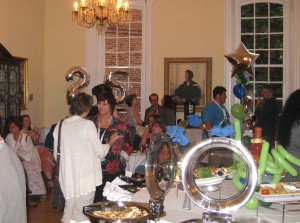 My flight back from Washington DC has been cancelled and they moved me and my colleague from York University, David Smukler, to another flight 4 hours later. We’ve been sitting, catching up with our reading, and I thought I might start a blog post on my experience this week at the VASTA (Voice and Speech Trainers Association) conference held at George Washington University’s Mount Vernon campus this week. I can’t seem to get on the net, so I will have to post when I am back home.
My flight back from Washington DC has been cancelled and they moved me and my colleague from York University, David Smukler, to another flight 4 hours later. We’ve been sitting, catching up with our reading, and I thought I might start a blog post on my experience this week at the VASTA (Voice and Speech Trainers Association) conference held at George Washington University’s Mount Vernon campus this week. I can’t seem to get on the net, so I will have to post when I am back home.
This year was VASTA’s 25th anniversary, and so there was a lot of celebrating the past, and a fair bit of looking ahead to the future, too. Unlike many of these kinds of conference, this year there was quite a lot of food provided for attendees, which made life much easier as we didn’t have to seek it out so much, and we could easily bring a box lunch into a session.
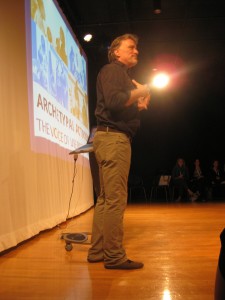
Since 2005, VASTA has been increasing the number of opportunities for members to present at the conference. Initially, there was only a single day of member presentations (and 3 days of workshops with an invited team of guest Presenters); this year the conference was full of members showing there work, with relatively few presentations from invited guests. Two of those guests really stood out: Brent Blair, who is a Linklater voice teacher, a Jungian psychologist, and a Boàl-based Theatre of the Oppressed practitioner, and Michael Rohd, who is a devised theatre guy from Sojourn Theatre in Chicago, who works in, and teaches at Northwestern University, devised theatre for civic engagement. Brent was returning to VASTA this year, as his first workshop at the VASTA conference in Chicago last year was so popular that they asked him back right away. His initial session was very powerful, and got the conference off to a very moving, deeply felt start. Though I missed Michael Rohd’s session on how he works, I did make the session he lead on examining where the VASTA membership would like the organization to go, and he managed to get us to go deep and to work very successfully at identifying goals without getting people’s noses out of joint. His rigor with the work, and his insistence that we carefully watch the time so as to use it effectively was as inspiring as the results we were able to achieve.
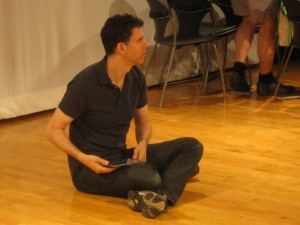
For me, the conference was a whirlwind of presentations that I was involved in. My first contribution was a panel on MFA programs in voice training, hosted by Betty Moulton from the University of Alberta. David Smukler and I presented on York, so attendees could compare us with UofA, Central school, ART/Harvard, and Virginia Commonwealth. Tuesday morning I was on Amy Stoller’s panel about Stereotypes in Accent coaching. The panelists weren’t fighting it out as I had imagined maybe they would—we all generally agreed that stereotypes, with great care and caution, might have a place as a cultural shorthand, and that they can be used, in the right hands and at the right time, to make people think about what their preconceived notions might be.
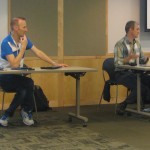
Next up was my share of the Technology Panel, which is a standing gig that I do with Michael Barnes, and Phil Thompson (who was away this year). It went really very well in spite of not spending much time preparing, and I found myself talking about how I use my iPad at least as much as my laptop these days. Then I had the panel that I organized myself, which was on Asian Accents, with my panelists Erik Singer, Marina Tyndall, Steven Eng and Jane Guyer Fujita. It was a real lightning round with us only getting to talk for 12 minutes each after a technological delay. But we have all put some fabulous resources up on my website at yorku.ca/earmstro/asia/ that should be invaluable to our colleagues. The other panelists were very inspiring, far more so than I was, and their resources are great. I hope you will check them out!
I also found myself talking a LOT at the brown bag lunch Support Group for Teaching Philosophy writing. Because I guide my Voice Diploma students in the process, it’s something that I have thought a lot about, and it was a great way for me to give back to the organization and to get to know the younger members better.
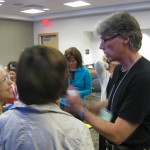
One of my favorite sessions was with UofA’s David Ley, who presented on how to use a personal vibrator to do voice work by applying it to the larynx, and various parts of the skull, to enhance and encourage vibration. I tried it out myself for about 20 minutes and it did make a remarkable difference. I expect that we’ll be hearing a lot more about this approach in the years ahead.
Another one of my favorites was watching my mentor and colleague, David Smukler, do an autobiographical talk about his development of a number of exercises over the years, and how they evolved. At one point he got very emotional as he remembered his very first day studying in the Kristin Linklater workshop where he trained to be a teacher, doing his very first instance of floating his elbows, wrists and fingertips up, and then doing his very first roll-down. Lovely stuff.
VASTA wouldn’t be what it is without the wonderful people who make it all possible. Patty Raun, the president of the organization, made superhuman efforts to get this conference to work, due to some challenges that arose when the original planner had to step down for health reasons. In many wys this year’s conference was better than ever.

And of course, for me, much of the joy is the time for our community to come together, to celebrate each other as peers and friends, and to share what we’ve discovered in the past year. I so value my time with friends from my time as a board member and officer, time singing together, or talking over a meal or a drink. Their supportive words about the challenges I’m facing in my personal life are very uplifting, and I feel recharged not just as a teacher, but as an all-round person. And delightful to have former students of mine, like Erika Bailey who I taught at Brandeis in 2000, now presenting and teaching me about their own discoveries. Erika’s talk on text and embodying the structure of the language was delightful, and full of stuff I hope to appropriate for this Fall. Fantastic.
One word of thanks: to my beloved wife, Amy, who made it all possible for me by watching our boys this week while I got to work and play and socialize in D.C. She is my foundation.
Thanks for the brief decompress. I think I will be processing for a while. I think I really enjoyed doing no teaching and gifting myself the place of being open to everything. I learned an enormous amount – in no small part thank to your contributions. Hilary spoke about how helpful it is to put faces to vox names. I do have to take exception to the food. I thought the boxes were practically inedible. But that was a very small sacrifice in comparison to the bounty I was being fed. Thanks for everything.
Dear Eric,
Thank you so much for this summary from your perspective! You got to things that I was sorry to miss . . . so it is especially nice to read about your experience. Thank you so much for coming — I know how difficult it is to leave your responsibilities at home. Thank you Amy!
Love, Patty
Eric, thank you so much for writing this! It’s great to hear your experience. I agree that this conference was truly exhilarating. Patty – thank you for that too! Being a relative newcomer to the conferences, I didn’t realize that the member presentations used to be limited. I think it’s a great development that there’s now so much time for all of us to share our expertise with each other.
Thanks, Eric! Just getting around to some things after also getting stuck in DC on the way out, and then driving cross country to start teaching 4 new classes at Cal State Long Beach! It was swell of you to attend our Statement of Teaching Philosophy Support Group and to provide us with your valuable insights. It’s not just the “younger” members that are looking for help in these things, but newer teachers, too, and even some seasoned teachers or artists/coaches who are transitioning into academic teaching.